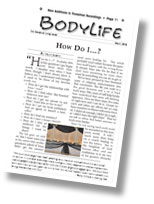A few days ago, I received a circular email from a website that helps with ‘church planting. I don’t usually respond to such things, but this time I just felt inclined to do so. The statement that caught my eye in the email was: “Church planting is one of the strategies used by the Apostle Paul to grow the early church and even today studies tell us that it is the most effective way to impact a community with the Gospel of Jesus Christ.” So I wrote back with just a one-liner, “I’m not sure I agree with the premise here…” The following conversation ensued, beginning with his response to me:
You are welcome to discuss it on my forum if you have questions.
That’s fine… Got too much email now. I just didn’t want to let the assumption blow by…
Okay, however, the statement is not an assumption, but a conclusion based on Scripture and research. Just wanted to clarify your mischaracterization…
Clarify away… I don’t mind a bit.
But what you may consider a ‘conclusion based on Scripture and research’ may still be an ‘assumption based on Scripture and research’. I find no language in Acts or in Paul’s letters that speak of a ‘strategy to plant churches’. Do you? And if it isn’t there, then it is a speculation about his strategy, not a given conclusion.
Isn’t it just as likely to characterize Paul’s travels and teaching not purposed to plant churches, but to spread the gospel and make disciples? I think that is stated far more clearly. The churches he identified and visited later could have been just the fruit of doing the former things that Jesus clearly asked his followers to do. In my view you can plant all the churches you want and never see true discipleship happen or true community. God knows I’ve visited hundreds of those. But you can’t teach people how to walk with the King and not see the reality of church life spring up all around you.
The distinction may sound like semantics, but I don’t think it is and thought it was worth noting or I wouldn’t have responded to you…
But you’re free to see it differently. Many do!
I don’t disagree with anything you wrote in the second paragraph and as a matter of fact I think you are absolutely right. I would add that the same can be said for house churches or any group that calls itself a church! If we do not put first the preaching of the Gospel (which includes the call to discipleship) then all our efforts are in vain.
As to Paul’s strategy to plant, no there is nothing much in Scripture that gives a specific strategy to plant, but of course you also realize there is nothing in there about his strategy for house churches. So I guess we are both in trouble huh? 🙂
Seriously though, let me ask, what exactly do you see as the assumption? What part of the statement do you find to be in conflict with Scripture?
I’m not really a house church guy, so I’m not sure I’m in trouble there. 😉 I see Jesus’ church take on a number of living expressions when people learn to follow him first and love each other second. House church is one of those. And I think it can be done incredibly well. But I also think it can be done with incredible religion and pain.
The assumption I was referring to is that church planting was a strategy Paul used to grow the early church, or that it is the most effective way to impact a community with the Gospel of Jesus. I don’t see them ‘in conflict’ with Scripture as much as I see assigning a priority to them that Scripture doesn’t assign. I’m not saying it is unscriptural, but at least it is extra-scriptural. The fruit of something doesn’t necessarily prove the intent. That churches sprang up in most places Paul frequented is a fact and they all seemed to be based around homes. For example, many people point to the characteristics of the early church in Acts, saying that if we duplicated their life, we’ll experience the same reality. I would argue that their life in Jesus, produced a certain relational reality among them. You can’t imitate the fruit and have the fruit. You have to have the same LIFE in Jesus that they had. That life will produce the expressions of community that Jesus wants. I don’t see that it works the other way around.
This is not a major point for me, and I don’t consider that we are deeply estranged over this. I see it as a matter of emphasis, and I thought I’d respond to your first note just to get you thinking a bit. In the end you may stay with your conclusion and I’ll not lose any sleep over that and hope you don’t.
Wayne, thanks for your thoughtful response. I sense there is a lot of wisdom in what you write. All I can say is that I will need to really think about it and spend some more time reading Scripture.
In my own thinking, The Scripture says that faith comes from hearing and hearing from the proclamation of God’s Word. I take the term “planting” to mean the sowing of God’s seed (His Word) into a community and growing a church from that seed. So in the broadest sense, I understand Paul’s mission to the Gentiles was to go from city to city, preach the Word, and establish a local gathering of believers. That is how I see church planting. Obedience to God’s call to enter an area where the Gospel needs to be preached and then establishing a congregation for the purpose of growing those followers to full maturity of faith.
Again, this is a rough summary of what I have in mind when I talk about planting a church. I will try and weigh this in the balance of what you have shared with me.
Thanks for taking time to share with me brother! I appreciate your willingness to offer some loving admonition and correction.
I appreciate your spirit in talking through all this. But I wasn’t trying to admonish or correct, just offer a different view of things that may nor may not be helpful to your journey.
You’re rough summary of planting a church is better than most, and I like much of it. But it still has some weaknesses by focusing on a priority that I would consider to be a fruit not an objective. I know few ‘established’ congregations that really help believers experience full maturity. Most times the effort over ‘gathering’ and ‘forming’ suck up the life of believers wanting to grow rather than actually helping them do that. I realize there are exceptions to this, but they are exceptions. I hope you have some fun with Jesus sorting through this as he continues to lead you on. In the end, Jesus told us to proclaim the gospel and make disciples, and he would build his church. We do seem to get that backward. When we take it our ourselves to build the church, discipleship rarely happens and the demands of the institution almost always seem to overrun the relational realities the church needs to flourish. In the end, I think Paul returned to those cities to help them see what Jesus was doing to build the church in his area, and helped them recognize it, rather than to impose an organizational model from outside. That’s why they seemed to develop very differently in different communities.
I’ll give you an example of this. When I taught ‘church planting’ teams for an international missions group, I would break the class up into small groups the first day. I told them they were ‘church planting’ teams. They chose the country and city and then I gave them an hour to sort out the questions they would need to resolve as they were getting started. Their concerns and questions all revolved around finance, building rental, publicity, statements of faith and all the other things that go with a corporate endeavor.
Two days later I broke them into the same teams, told them they were going into the same city, but this time not to plant a church but to demonstrate who Jesus is to the people and help them learn how to follow him. The questions and issues they came up with from that assignment was remarkably different and far more powerful. Now it was about meeting people, getting jobs that would link them to the community, learning how to share their faith naturally not artificially and how to help people connect in a real way with him. Finances, buildings and publicity never came up. That’s the difference I’m talking about, if that makes sense.
I’ve had fun thinking through this again with you. Thanks for being so open…
All good points and I think you are right on! I love that exorcise and will use it with our own people. It is hard in the US not to get hung up on the stuff, and I have tried to do some things to keep us more focused on people and relationships, but it is always difficult to keep the first things first. An exercise like the one you share could be a big help to me.
That’s great! It’s always hard to keep the main thing the main thing!





 OK, we’re not exactly doing that, but today I did upload the PDF file of the rewrite of my first book ever—
OK, we’re not exactly doing that, but today I did upload the PDF file of the rewrite of my first book ever—
 As I said in a previous post, I read C.S. Lewis’ novel, Til We Have Faces again over my recent vacation. What a story! Set in ancient Greek mythology, this work exposes some incredible truths about our misplaced anger at God our misunderstanding of the ways in which he works. I won’t ruin this fairy tale for you but it involves two stepsisters of royal blood in an ancient European kingdom. One is taken away and the older fears she is being deceived by a cruel beast or some vile criminal even though she assures her older sister that she is living in a beautiful palace and has come to find the lover her soul has longed for.
As I said in a previous post, I read C.S. Lewis’ novel, Til We Have Faces again over my recent vacation. What a story! Set in ancient Greek mythology, this work exposes some incredible truths about our misplaced anger at God our misunderstanding of the ways in which he works. I won’t ruin this fairy tale for you but it involves two stepsisters of royal blood in an ancient European kingdom. One is taken away and the older fears she is being deceived by a cruel beast or some vile criminal even though she assures her older sister that she is living in a beautiful palace and has come to find the lover her soul has longed for. Well, our blissful vacation on the Olympic Peninsula ended early because of the constant shelling of our quiet seaside cottage by the neighbors on the hill behind us, who started celebrating July 1 with thousands of dollars of fireworks that began in the late morning and continued well past midnight on one evening. And it wasn’t even the Fourth yet.
Well, our blissful vacation on the Olympic Peninsula ended early because of the constant shelling of our quiet seaside cottage by the neighbors on the hill behind us, who started celebrating July 1 with thousands of dollars of fireworks that began in the late morning and continued well past midnight on one evening. And it wasn’t even the Fourth yet. I am blessed to be able to finally have a recording of the most important teaching I do around the world to help people sort out how to move from religious thinking about their life in God and learn to live relationally as he designed us to. Recently on a trip to Pennsylvania, I did eight and a half hours of teaching over two days helping people sort out how to live out a relationship with God that is not manipulated by our shame nor based on our performance. Instead it is motivated purely out of God’s love for them as we discover how to respond to him.
I am blessed to be able to finally have a recording of the most important teaching I do around the world to help people sort out how to move from religious thinking about their life in God and learn to live relationally as he designed us to. Recently on a trip to Pennsylvania, I did eight and a half hours of teaching over two days helping people sort out how to live out a relationship with God that is not manipulated by our shame nor based on our performance. Instead it is motivated purely out of God’s love for them as we discover how to respond to him. The July 2006 issue of
The July 2006 issue of